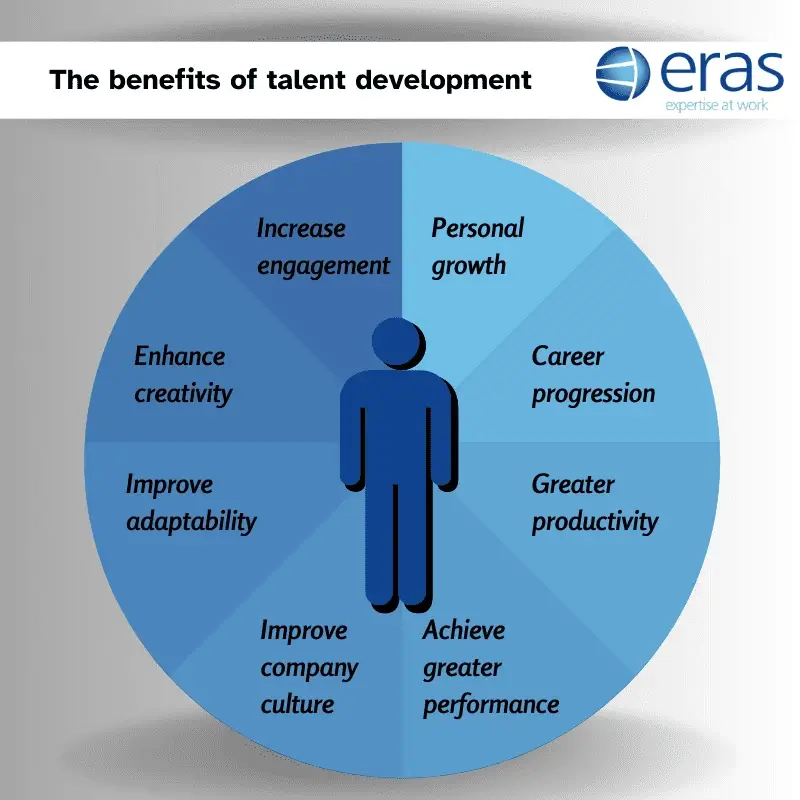What Is Talent Development And Why Is It Important?
Talent development is essential in every business, no matter the industry. It benefits not only individuals but also teams and the wider business. From manufacturing, agriculture and industry to technology, finance and marketing, talent development can make a difference. So, what is talent development and how can it help you?
Understanding Talent Development
Talent development is the process of nurturing an individual's skills and abilities. This usually involves identifying any innate talents as well as developing acquired and desired skills. Talent development optimises performance and personal growth, as well as contributes to the overall culture and profitability of an organisation. Often you'll find that leadership and talent development go hand in hand to turn team members into leaders, guide the workforce, and support the wider business.

It isn't enough for businesses to take a reactive approach to talent development. In fact, a recent article from People Management highlights the importance of proactivity, especially to fill prominent gaps in the UK skills market.
[Henley Business School] identified the following as the most prominent gaps in skills in the UK: soft skills and behaviours; digital and technology; and interpersonal skills… in a continually shifting work environment, the abilities and behaviours required to successfully lead teams and deliver tasks are changing.
-- Mahalia Mayne, 2023
The Benefits Of Talent Development
One of the key elements of talent development is that it doesn't just benefit the individual. A learning and talent development strategy will nurture entire teams, as well as ensure the needs of the wider business are met. Here's how it can benefit you.

- Personal growth - Self-discovery, self-improvement, and self-awareness are key aspects of talent development. This leads to personal growth and a deeper understanding not only of capabilities, but also potential.
- Career progression - Talent development gives individuals the tools, skills, and knowledge that they need to progress in their career. It can mean new responsibilities and increased opportunities.
- Greater productivity - Time management skills, as well as efficiency and effectiveness, are some of the skills that talent development strategies focus on. These skills can improve productivity.
- Achieve greater performance - Learning and development is essential in any industry, but giving your teams the tools that they need to succeed will not only increase productivity, but also lead to a greater performance.
- Improve company culture - Talent development initiatives foster a culture of continuous learning, collaboration, and personal development. Not only does this contribute to a positive and engaging work environment, but it can actually increase revenue. Forbes states that 'Culture Is A Company's Single Most Powerful Advantage', as “companies with a strong culture have seen a 4x increase in revenue growth”.
- Improve adaptability - Change is inevitable, but the ability to adapt to change is not. The COVID-19 pandemic forced many businesses to rapidly adapt their methods, and individuals and teams able to adapt responded better to the changes they faced. There are a number of leadership qualities necessary for the digital era (Harvard Business School), but a survey revealed that the most critical trait was adaptability (71%).
- Enhance creativity - Creativity and the ability to innovate are powerful tools. Individuals and teams with these skills are able to find unique solutions to problems and implement critical thinking into their everyday lives.
- Increase engagement - When engagement drops, so does job satisfaction and productivity. UK employee engagement has fallen to record low levels, but talent development can improve it by showing individuals and teams that their growth is important during turbulent times. It shows that they are valued as individuals.
Effective Talent Development Strategies
Developing talent can be costly, especially if you don't have clear strategies in place. According to the workplace learning and development statistics and facts from the Statista Research Department, the average annual spend per employee on learning and development worldwide is $1,280, which is just over £1,000.
Adaptability And Customisation
One of the key aspects of an effective talent development strategy is adaptability. There is no 'one size fits all' when it comes to talent development, so your strategy has to be able to change for each individual.
Your business and staff are unique, which is why a customisable approach is essential. Whether you are looking to identify those individuals with management potential or you want to build the interpersonal skills of a team, your strategy has to adapt with each individual.
Talent Development Assessment
Assessment is another vital step. Before you begin to develop talent, you need to understand any innate skills and potential, as well as barriers to success. A talent development assessment can not only identify those inherent strengths but also potential weaknesses and barriers to success.
A psychometric assessment can help with these by providing impartial insight into individuals and teams. The threesixty° is a powerful and completely customisable assessment tool, used to gather feedback from a variety of people, identify strengths, and ascertain development needs.
Access To Training, Learning And Talent Development
Developing talent doesn't have to be focused entirely on the skills that you'd like them to have - it can also be about enhancing their natural talents. This means providing access to training, learning and education, whether through free courses or paid conferences.
One way to achieve this is by setting aside personal development time, where individuals can focus on bettering themselves and improving their skills. This can really help individuals and teams to thrive in unexpected ways. It also ensures that your company culture is one focused on nurturing individuals and creating a supportive environment for talent to thrive.
Talent Development In Different Industries
One of the fascinating aspects of talent development is how it might change in different industries. The adaptability of talent development means it can help companies across industries unlock the potential of future leaders, the creativity of teams, and cultivate a culture of engagement and resourcefulness.
Business
For many businesses, the focus of talent development strategies is to nurture leaders and foster entrepreneurial abilities. Future leaders can work on their strategic thinking and decision making skills. Targeted training and mentorship can also enhance communication skills and innovation.
Academia
Talent development in academia has become increasingly popular, especially for building critical thinking, problem solving, and analytical skills. It can also support high-quality research and nurture the culture of lifelong learning within a role.
The Arts
Creativity is important in all industries, but especially within the arts. Innovation and expression can be cultivated through talent development, as well as technical skills. The supportive and inspiring environment of talent development ensures individuals and teams can push boundaries and create new, diverse methods of thinking.
Why Talent Development Is Important To All Industries
Talent development is crucial to all industries as it empowers individuals to unlock their full potential, acquire essential skills, and continuously grow and adapt in a rapidly changing world. By investing in talent development, organisations foster a culture of innovation, excellence and learning, which can lead to increased productivity, performance and profitability.
What is talent development in your business like? If you are unsure of how your in-house team can nurture talent, we can help. At eras, we offer numerous products and associated consultancy services to optimise your talent development. We will work in partnership with your organisation to identify and explore your requirements, and give you the knowledge your business needs to develop talent.